Below are the USIH-adjacent books that I’m enjoying currently. I created a similar post last year at the start of 2021. What are you reading, or planning to read?
ONE: The Museum: A Short History of Crisis and Resilience by Samuel J. Redman (April 2022)
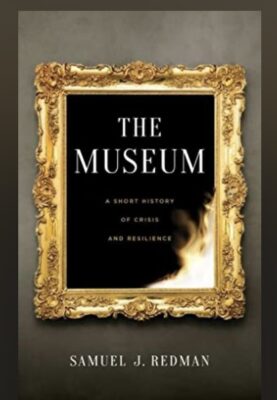
THE MUSEUM by Samuel Redman
The Museum traces the history of museums confronting crises in the modern U.S.: World War I, the Great Depression, World War II, 1970s protests, 1980s-1990s history wars, and contemporary issues. The book carefully balances museums themselves, the history of museums, and how that historical context shaped the museums themselves. Redman mentions that this is a short not cumulative history: it emphasizes famous, sizable, American museums, though broader trends apply to smaller ones, too. Sources include institutional records and newspapers. The Museum should be popular among public history graduates, public historians ‘in the field,’ and museum visitors seeking a history of museums adjusting to change and shaping history.
TWO: South to America: A Journey Below the Mason Dixon to Understand the Soul of a Nation by Imani Perry (January 2022)
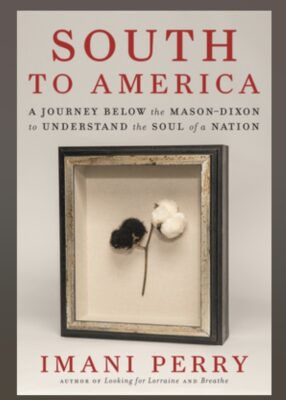
SOUTH TO AMERICA by Imani Perry
South to America by Imani Perry offers narrative nonfiction of the Southern U.S. centering Black perspectives. Perry’s fusion of research with personal insights is in the style of Clint Smith’s How the Word is Passed or Michael Twitty’s Cooking Gene, which are both well-deserved best-sellers. But Perry’s targets are even more specific. She makes clear that while racism is definitely not specific to the South, race has had a particular way of manifesting in American Southern history. As early as the first chapter, she points out that Tony Horowitz’s Confederates in the Attic was more intrigued by Confederates than the plight of actual Black people. Readers gain a wide range of insights and nuances from South to America.
THREE: Out of Office: The Big Problem and Bigger Promise of Working from Home by Anne Helen Petersen and Charlie Warzel (December 2021)
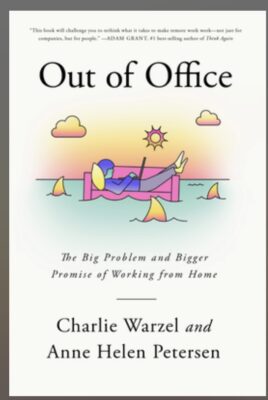
OUT OF OFFICE by Anne Helen Petersen and Charlie Warzel
Out of Office fuses historical thinking, social theory, and concrete examples from the past, present and future to contribute valuable insights about the future of work. It advocates for sturdier guardrails to protect knowledge workers’ life from work. While writing with a collective, structural focus, some recommendations apply to individuals, such as finding a meaningful hobby totally unrelated to academic or professional pursuits (writing for USIH doesn’t count!). Out of Officeby Anne Helen Petersen and her husband Charlie Warzel builds on Petersen’s Can’t Even: How Millennials Became the Burnout Generation.
FOUR: The Week: A History of the Unnatural Rhythms That Made Us Who We Are by David M. Henkin (November 2021)
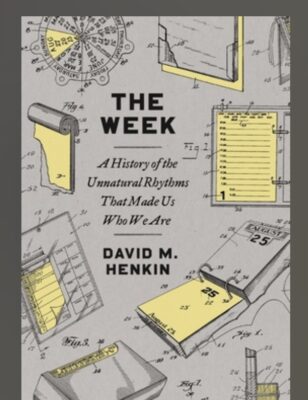
THE WEEK by David Henkin
The Week is a political and cultural story of the days of the week by historian David Henkin. “Weeks are essentially social institutions, rooted entirely in human habits,” he writes on the first page. Even the idea that each weekday has a particular character – the pain of Mondays, hump-day quality of Wednesdays, thrill and relief of Fridays – aims to reinforce a social construct. The common experience of forgetting what day it is, therefore, exposes “cracks under our feet.” While noting that the week began with concerns over “religion and labor,” Henkin centers culture and the politics of daily life.
FIVE: Antisemitism on the Rise: The 1930s and Today edited by Ari Kohen and Gerald J. Steinacher (October 2021)
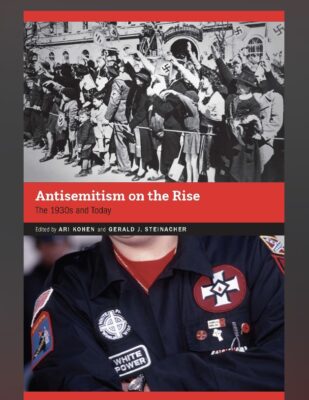
ANTISEMITISM ON THE RISE edited by Ari Kohen and Gerald Steinacher
Antisemitism on the Rise takes on the on the urgent issue of rising antisemitism through an edited essay collection. Rather than a comprehensive account, the book selects individual moments to explore. For example, philosopher Jean Cahan’s chapter analyzes and critiques Hannah Arendt’s philosophy of antisemitism in the first third of Origins of Totalitarianism. Antisemitism on the Rise’s final essay, by Holocaust educator Scott Littky, discusses the role of antisemitism and Holocaust education in schools today, turning readers away from old-school facts and statistics and toward a new pedagogy that fuses primary sources with combatting antisemitism today.
SIX: Black Reconstruction in America, 1860-1880 by W. E. B. Du Bois (1935)
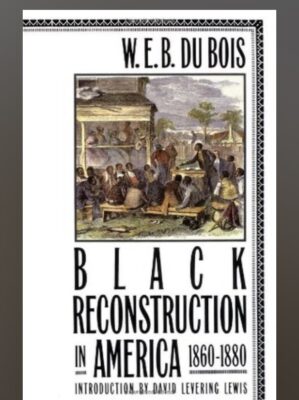
BLACK RECONSTRUCTION by W E B Du Bois
Though not a forthcoming or recent publication like the aforementioned books, Black Reconstruction by W. E. B. Du Bois is timeless. I originally came across it in Rob Greene’s writings and read it for the 2019 USIH pre-conference discussion group. Recently, Black Reconstruction has been invaluable to my high school classroom, especially two passages about emancipation and Andrew Johnson respectively.
Du Bois on emancipation: “There was joy in the South. It rose like perfume – like a prayer. Men stood quivering. Slim dark girls, wild and beautiful with wrinkled hair, wept silently; young men, black, tawny, white and golden, lifted shivering hands, and old and broken mothers, black and gray, raised great voices and shouted to God across the fields, and up to the rocks and the mountains. A great song arose, the loveliest thing born this side the seas. It was a new song. It did not come from Africa, though the dark throb and beat of that Ancient of Days was in it and through it. It did not come from white America – never from so pale and hard and thin a thing, however deep these vulgar and surrounding tones had driven. Not the Indies nor the hot South, the cold East or heavy West made that music. It was a new song and its deep and plaintive beauty, its great cadences and wild appeal wailed, throbbed and thundered on the world’s ears with a message seldom voiced by man. It swelled and blossomed like incense, improvised and born anew out of an age long past, and weaving into its texture the old and new melodies in word and in thought. They sneered at it – those white Southerners who heard it and never understood. They raped and defiled it – those white Northerners who listened without ears. Yet it lived and grew; always it grew and swelled and lived, and it sits today at the right hand of God, as America’s one real gift to beauty.”
Du Bois on Johnson: “The transubstantiation of Andrew Johnson was complete. He had begun as the champion of the poor laborer, demanding that the land monopoly of the Southern oligarchy be broken up, so as to give access to the soil, South and West, to the free laborer. He had demanded the punishment of those Southerners who by slavery and war had made such an economic program impossible. Suddenly thrust into the Presidency, he had retreated from this attitude. He had not only given up extravagant ideas of punishment, but he dropped his demand for dividing up plantations when he realized that [Black people] would largely be beneficiaries. Because he could not conceive of [Black people] as men, he refused to advocate universal democracy, of which, in his young manhood, he had been the fiercest advocate, and made strong alliance with those who would restore slavery under another name. This change did not come by deliberate thought or conscious desire to hurt – it was rather the tragedy of American prejudice made flesh; so that the man born to narrow circumstances, a rebel against economic privilege, died with the conventional ambition of a poor white to be the associate and benefactor of monopolists, planters and slave drivers.”

One Thought on this Post
S-USIH Comment Policy
We ask that those who participate in the discussions generated in the Comments section do so with the same decorum as they would in any other academic setting or context. Since the USIH bloggers write under our real names, we would prefer that our commenters also identify themselves by their real name. As our primary goal is to stimulate and engage in fruitful and productive discussion, ad hominem attacks (personal or professional), unnecessary insults, and/or mean-spiritedness have no place in the USIH Blog’s Comments section. Therefore, we reserve the right to remove any comments that contain any of the above and/or are not intended to further the discussion of the topic of the post. We welcome suggestions for corrections to any of our posts. As the official blog of the Society of US Intellectual History, we hope to foster a diverse community of scholars and readers who engage with one another in discussions of US intellectual history, broadly understood.
I’m reading Menand’s _The Free World_, and if I ever finish it I’ll probably read after that Barry Gewen’s book on Kissinger, which I know already I’m going to have disagreements with.